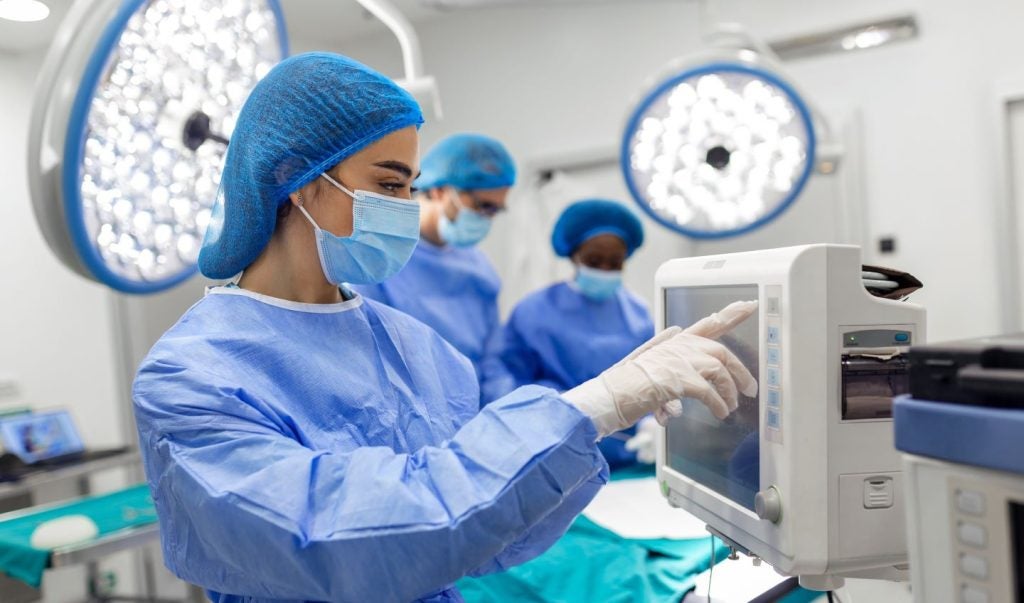

It has been over a decade since Emily Whitehead was declared cancer-free after the first successful, experimental CAR T-cell treatment, a moment which marked a huge development in precision medicine. Since then, the landscape has focused on CAR-T therapies with six of these now approved. One of the newest movements in the field is with CRISPR therapies, further progressing the ability of precision medicine to provide long-term effective treatments for rare and complex diseases.
According to GlobalData’s Pharmaceutical Intelligence Centre, cell therapies remain the leading drug type by clinical trial count. However, there has been a notable increase in gene therapies in the past few years.
GlobalData is the parent company of the Clinical Trials Arena.
Only 39 gene therapies were marketed by the end of H1 2023. Despite this, the market is expected to grow drastically over the next decade, with GlobalData predicting that gene therapies will generate nearly $54bn in sales by 2029. At the same time, the cell therapy market is also expected to surge, with a predicted forecast of over $52bn by 2029, up from nearly $3bn in 2022, according to GlobalData.
Precision medicine trials have always been oncology-focused due to the mechanism of action (MoA) of most candidates, targeting and killing T-cells. The field continues to favour oncology however, other indications, especially rare diseases, are now being investigated to see how they can utilise precision medicine.
How well do you really know your competitors?
Access the most comprehensive Company Profiles on the market, powered by GlobalData. Save hours of research. Gain competitive edge.

Thank you!
Your download email will arrive shortly
Not ready to buy yet? Download a free sample
We are confident about the unique quality of our Company Profiles. However, we want you to make the most beneficial decision for your business, so we offer a free sample that you can download by submitting the below form
By GlobalDataDr Dalip Sethi, commercial leader of cell therapy technologies in North America, says that the knowledge that scientists have gained about precision medicine is already being utilised in autoimmune diseases. “Autoimmune diseases need a lot of attention and a lot more companies are working on them which is exciting to see,” Sethi says. “The regulatory mechanisms of T-cells – exploring them and suppressing the autoimmune system, that is very exciting to see because that is a huge need in the market.”
Technology can improve accrual rates in trials
One of the biggest pain points for any clinical trial is trial termination. According to GlobalData’s Pharmaceutical Intelligence Centre, most precision medicine trials were terminated due to low accrual rates.
While Peter Keeling, CEO of Diaceutics, says that one of the main reasons for low accrual is that a large number of precision medicine trials target rare diseases. As a result, some drugs which may show strong signals do not progress to market. “There is the conversation going on in biotech companies about how they proceed because they know that they have a signal in the drug,” Keeling says.
Bikash Chatterjee, CEO of Pharmatech Associates, says that AI is becoming a big player in reducing dropout rates by more accurately linking patients with the best trials. “Clinical operations also rely upon AI to identify qualified candidates for clinical studies to make patient engagement easier to minimise dropout rates,” Chatterjee says.
Better use of biomarkers will further develop the field
One of the biggest advancements in precision medicine is the use of biomarkers. Biomarker diagnostic tools have advanced greatly in recent years, with oncology remaining a key area for biomarker-driven therapy. Consequently, biomarkers will be used to target subpopulations across cancer types, for example, the identification of specific mutations in tumour cells.
The development of new diagnostics and discovery of new biomarkers will advance the precision medicine space as physicians will be better placed to identify targeted treatments for more indications.
Further research into biomarkers and more advanced diagnostic tools will be required to drive the development of next-generation precision medicine. Sethi believes that this can be a way to utilise AI in precision medicine to identify both clinical trial populations and patient populations post-approval.
One advancement is the invention of digital biomarkers, moving away from the traditional blood biomarker model. NeuraLight, a startup developing an AI-driven platform that measures eye movements to diagnose neurological diseases.
Chief commercial officer, Vivian DeWoskin, says that its computer-based oculometric test tracks eye movements with a standard webcam and analyses them using machine learning techniques. Th technology is hoped to be used for diagnostic, predictive and treatment success tests.
“We've seen oncology really blossom in precision medicine and neurology is ripe for that same kind of innovation and improvement in patient outcomes,” DeWoskin says. “We hope technology like ours can augment the clinic trials that are being run in neurology and usher in that era of more precise, more effective disease modifying therapies.”
Matthew Lakelin, VP scientific affairs and product development at TrakCel, notes that biomarkers will be used more effectively due to standardisation across the industry. “It is being uniformed across the industry,” Lakelin explains. “That standardisation is really useful because it's been designed around legislation as well. Whether you are providing precision medicine in North America or Europe or Asia, it is the same.”
Josh Ludwig, director of ScaleReady, says that the use of biomarkers will push precision medicine even further, allowing combination precision therapies to be used. “Where I see the field going is more combination therapies and even combination technology,” Ludwig declares. “Analysing somebody's blood with some of these new tools and identifying biomarkers and all the different targets on that specific patient and giving combination therapies. In those applications, we can apply artificial intelligence and machine learning.”
AI will be used at all stages - from R&D to market
With AI being utilised in all areas of life, it will likely have a big impact on precision medicine at all stages of drug development. According to GlobalData’s Drugs database, there are over 40 cell and gene therapies that have been developed using AI.
Chatterjee says that AI will bolster research in both cell and gene therapies. “AI has the capacity to impact both in a myriad of ways,” Chatterjee says. “There is a huge potential for gene therapy because AI’s ability to predict protein structures has been shown to enhance the DNA scissor technology like CRISPR by making more cuts in a patient's DNA more precise.”
“Actually identifying receptor targets and drug targets would be fantastic with artificial intelligence,” Lakelin adds. “It could potentially remove a lot of the preclinical work and screening that is necessary by being able to identify the key drug candidates sooner.”
Technology will aid the advancement of a bright future
As technology continues to develop and with the advancements in AI, there is hope for even more progression in the space over the next 10 years, but specialists have many different theories about what will be the big moment for the next decade.
Ludwig says that moving back and reflecting on previous learning will be the way to progress, noting that the world needs to have a generalised way to develop cell therapies to ensure availability to people from all corners of the world rather than just in specialist centres.
“We really have to standardise the way we manufacture these cells,” Ludwig explains. “And we need to do it in a way that focuses on the simplest, most stripped-down version of growing these cells. We want cell therapies to be available in less advanced areas of the world and to do that, we have to make it really easy to manufacture.”
However, Chatterjee believes that a myriad of technology will bolster the field. “It is not unreasonable to expect AI to become a part of the overall toolkit for all drug development including precision medicine,” Chatterjee explains. “However, in the near future, it is not likely that AI will be the only tool in the industry’s toolkit that feeds the drug development pipeline.”
Sethi believes that all drugs could have a precision medicine element in the future but accepts it will take a lot of work. “When I go to a physician, I would like a drug targeted towards the biology that I have,” Sethi says. “Everybody’s code is different and precision medicine looks at that code but it takes a lot of data.”
Still, Lakelin agrees that data is the key point for precision medicine to move forward. “For precision medicine to work, we need larger and larger data sets,” Lakelin concludes. “We need the ability to gather patient information in an anonymised manner so we can see trends that will help us understand the correct drug and correct dose for the correct patient.”
Cell & Gene Therapy coverage on Clinical Trials Arena is supported by Cytiva.
Editorial content is independently produced and follows the highest standards of journalistic integrity. Topic sponsors are not involved in the creation of editorial content.







